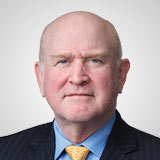Swiss-headquartered Novartis (NVS) is one of the 10 largest drug companies in the world, with particular strengths in multiple sclerosis, asthma, and diabetes, explains Gavin Graham, editor of Internet Wealth Builder.
Get Top Pros' Top Picks, MoneyShow’s free investing newsletter »
The company is also a leader in oncology (cancer), especially after swapping its vaccines business to Glaxo SmithKline (GSK) for the latter's oncology division in 2016. Its Alcon division is a market leader in eye care.
Novartis reported second quarter net sales of $12.24 billion, down 2% or flat in constant currency terms. Reported net income was up 11% to $1.98 billion while core net income was down slightly (but ahead of estimates) at $1.22 per share as the decline in sales of its major cancer drug Gleevec due to going off patent last year were offset by growth in new products.
The most exciting development for Novartis was the unanimous recommendation by an advisory panel of the FDA in July that its new anti-cancer drug Tisagenlecleucel should be approved.
The first gene therapy to be potentially approved in the U.S., the drug treats children with acute lymphoblastic leukemia (ALL), the most common form of childhood cancer, suffered by over 25% of childhood cancer victims.
A remarkable 83% of patients who had relapsed or failed chemotherapy achieved complete or partial remission against survival rates of 16%-30% for ALL patients.
While the drug, developed in partnership with the University of Pennsylvania, costs $500,000, it only needs to be taken once, as the patient's own T-cells are extracted and engineered to recognize specific cancer cells and then reinjected back into the patient.
Novartis says the treatment will take only 22 days when it becomes commercially available. The FDA is due to rule on approval by the end of September.
Approval of the technique should allow other gene therapies to be approved, including diffuse large cell lymphoma, the most common form of non-Hodgkins lymphoma, where Novartis has a gene therapy under test.
Novartis also had Erenumab, its migraine treatment, accepted for review by the FDA.
CEO Joe Jimenez reiterated the forecast of flat revenues in constant currency terms for 2017 and core operating income down by the low single digits. Given that Gleevec going off patent will reduce sales by at least $2.5 billion, this is a respectable performance.
The strategic review of the Alcon division, which may include its sale or a joint venture such as that with Glaxo for consumer healthcare, will be concluded by the end of 2017.
The recommendation to approve Novartis' gene therapy treatment for ALL shows the potential that its large portfolio of drugs possesses.
Novartis pays one dividend a year in March, which totaled $2.72, and gives it a yield of 3.2%. With the share price recovering, its AA balance sheet, and the Alcon review due to complete within the next few months, the stock remains a Buy.










